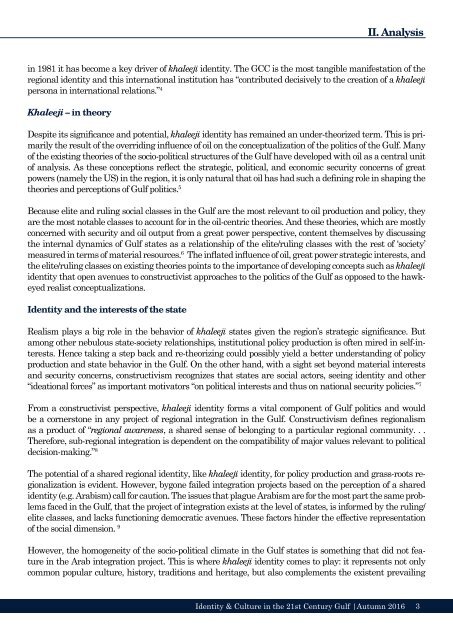You also want an ePaper? Increase the reach of your titles
YUMPU automatically turns print PDFs into web optimized ePapers that Google loves.
II. Analysis<br />
in 1981 it has become a key driver of khaleeji identity. The GCC is the most tangible manifestation of the<br />
regional identity and this international institution has “contributed decisively to the creation of a khaleeji<br />
persona in international relations.” 4<br />
Khaleeji – in theory<br />
Despite its significance and potential, khaleeji identity has remained an under-theorized term. This is primarily<br />
the result of the overriding influence of oil on the conceptualization of the politics of the Gulf. Many<br />
of the existing theories of the socio-political structures of the Gulf have developed with oil as a central unit<br />
of analysis. As these conceptions reflect the strategic, political, and economic security concerns of great<br />
powers (namely the US) in the region, it is only natural that oil has had such a defining role in shaping the<br />
theories and perceptions of Gulf politics. 5<br />
Because elite and ruling social classes in the Gulf are the most relevant to oil production and policy, they<br />
are the most notable classes to account for in the oil-centric theories. And these theories, which are mostly<br />
concerned with security and oil output from a great power perspective, content themselves by discussing<br />
the internal dynamics of Gulf states as a relationship of the elite/ruling classes with the rest of ‘society’<br />
measured in terms of material resources. 6 The inflated influence of oil, great power strategic interests, and<br />
the elite/ruling classes on existing theories points to the importance of developing concepts such as khaleeji<br />
identity that open avenues to constructivist approaches to the politics of the Gulf as opposed to the hawkeyed<br />
realist conceptualizations.<br />
<strong>Identity</strong> and the interests of the state<br />
Realism plays a big role in the behavior of khaleeji states given the region’s strategic significance. But<br />
among other nebulous state-society relationships, institutional policy production is often mired in self-interests.<br />
Hence taking a step back and re-theorizing could possibly yield a better understanding of policy<br />
production and state behavior in the Gulf. On the other hand, with a sight set beyond material interests<br />
and security concerns, constructivism recognizes that states are social actors, seeing identity and other<br />
“ideational forces” as important motivators “on political interests and thus on national security policies.” 7<br />
From a constructivist perspective, khaleeji identity forms a vital component of Gulf politics and would<br />
be a cornerstone in any project of regional integration in the Gulf. Constructivism defines regionalism<br />
as a product of “regional awareness, a shared sense of belonging to a particular regional community. . .<br />
Therefore, sub-regional integration is dependent on the compatibility of major values relevant to political<br />
decision-making.” 8<br />
The potential of a shared regional identity, like khaleeji identity, for policy production and grass-roots regionalization<br />
is evident. However, bygone failed integration projects based on the perception of a shared<br />
identity (e.g. Arabism) call for caution. The issues that plague Arabism are for the most part the same problems<br />
faced in the Gulf, that the project of integration exists at the level of states, is informed by the ruling/<br />
elite classes, and lacks functioning democratic avenues. These factors hinder the effective representation<br />
of the social dimension. 9<br />
However, the homogeneity of the socio-political climate in the Gulf states is something that did not feature<br />
in the Arab integration project. This is where khaleeji identity comes to play: it represents not only<br />
common popular culture, history, traditions and heritage, but also complements the existent prevailing<br />
<strong>Identity</strong> & <strong>Culture</strong> in the 21st Century Gulf |Autumn 2016<br />
3


